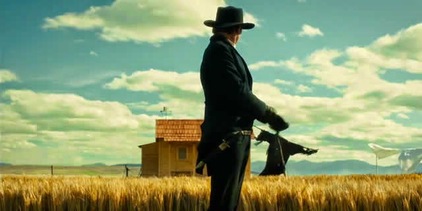
Slow West wins the 'Ain't Them Bodies Saints' award. Like that earlier period drama, this one also manages to blow its excellent cinematograpy with too much telling instead of showing. This is a significant let down because John Maclean's debut feature hits on several themes that I've long found interesting. The collision of the Old and New World, romantic ideas of the West, and some interesting gender politics are present, but Maclean's script lacks the courage of its convictions.
Michael Fassbender's character Silas Selleck narrates the goings-on, in which noble Scottish emigre Jay Cavendish (Kodi Smit-McPhee) is traversing the post Civil War frontier by himself, in search of his old-country crush Rose Ross (Caren Pistorius) and her father John (Rory McCann). The low-born Ross's fled to the US after contributing to an accidental death. Ill-suited to make the dangerous journey through war-town Indian country, Jay teams up with Silas, ostensibly as a guide though Silas is actually using Jay as a stooge. Silas, and several other bounty hunters including a group led by the prolific Ben Mendelsohn, are searching for the Ross's, and Jay is leading everyone to them.
Filmed in New Zealand, Slow West looks so good that it nears the Uncanny Valley. Establishing shots appear too painterly to be real. Shot by Robbie Ryan, who also did the cinematography for Andrea Arnold's haunting Wuthering Heights, Slow West never lets the viewer forget how empty the environment is. Characters often find themselves alone in vast fields, dwarfed by the untamed landscape with nothing in sight for miles. Maclean and Ryan also juxtapose the expansive with the claustrophobic, as dust storms box characters in or dense forests limit movement. As strong an advertisement for New Zealand as anything Peter Jackson has done, the natural beauty of the film communicates what was both alluring and forbidding about the frontier.
The environment forms one half of that frontier equation, and the cultural response to it forms the other. People like Jay, full of the romanticism that wealth allows for, were needed to spread the word, though people like Silas and the Ross's were the ones that had to do the hard and dangerous work of bending it to their will. Jay's romantic notions are quickly disabused, as an early scene finds him wandering through a devastated forest, he going in one direction and Indian widows and children moving in the other. Those he encounters on the way are desperate enough to steal or cunning enough to trick him out of his possessions. Jay looks down on Silas as a brute, but Silas is surviving, and for far longer than the badly-prepared Jay could hope for. The film proposes that survival requires a base of Silas with a pinch of Jay, lest all humanity be lost. How those refugee Indians fit into the equation is something best not thought about.
In attempting to make a statement on Manifest Destiny, Maclean overplays his hand. The narration is completely unnecessary, and repeatedly tells the viewer obvious things. The pairing of Jay and Silas is textbook odd-couple, with each rubbing off on the other. A traveling anthropologist apparently is coming from seeing Avatar in daguerrotypes, as he predicts that the vanishing Indians will eventually be condescended to with the noble savage trope. It's in this formula and speechifying that Slow West loses its way. A film that looks as great as this one should trust its audience to pay attention.
That impulse to make sure the viewer understands what the director is going for will hopefully be remedied as Maclean continues to work. Slow West is close to being great, culminating as it does in a thrilling, unpredictable climax where motives are turned on their head and salt is literally poured in wounds. A contemplative turn following the resolution is so striking, I'm surprised more films haven't done it before. Hopefully, Maclean returns to the Western well with more faith in his audience. B-
 RSS Feed
RSS Feed